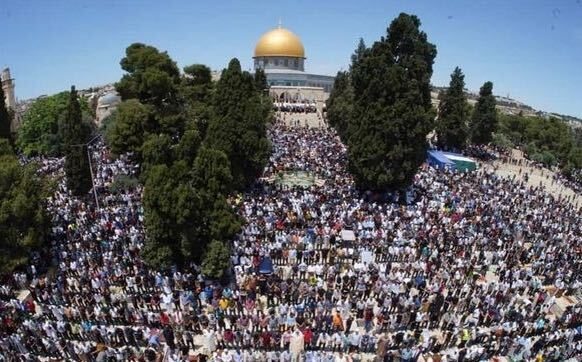Previous temporary Arab media capitals included Dubai, Baghdad, and Riyadh.
The Arab League crowned Jerusalem as the permanent capital of Arab media, in recognition of the regional focus on the Palestinian cause, the bloc announced on Saturday.
“Emphasising the centrality of the legitimate Palestinian cause, the council chose ‘Jerusalem’ is the first capital of the Arab media, as an expression of the sentimental status and the special historical and legal character of this holy city,” Ahmed Khattabi, the Arab League’s Assistant Secretary-General and Head of Media and Communication, said.
The Arab diplomat’s remarks came during a meeting with the bloc’s information ministers in Libya on the sidelines of the “Tripoli, as capital of Arab media 2022” event. A temporary Arab media capital will be selected every year by the council while Jerusalem continues to hold its permanent position.
“The title of Media Capital[…]is a tribute to the efforts of an Arab capital that made a performance as well as distinguished and tangible achievements in the media field,” Khattabi added.
Previous temporary Arab media capitals included Dubai, Baghdad, and Riyadh.
The diplomats also awarded slain Al Jazeera journalist Shireen Abu Akleh the “Al Saraya Al Hamra” award for press freedom during the closing ceremony of the event in Libya. Libyan media reported that the late journalist was the first to be named as the award’s recipient.
The veteran journalist was shot and killed by Israeli forces on 11 May while she was covering a raid by the Zionist state in Jenin.
The Israeli sniper had shot Abu Akleh while she was in her blue vest and helmet, which clearly identified her as a member of the press. More than seven months on, Israel has not been held to account for the killing despite the numerous witness testimonies along with independent investigations by rights groups and the media.
On 6 December, Al Jazeera submitted a formal request to the International Criminal Court (ICC) to probe and prosecute the perpetrators of the crime.
Jerusalem’s status
Israel captured East Jerusalem during the six-day war in 1967, known as the Naksa, or “the setback”.
The occupying state declared victory at the time after just six days, paving the way for it to expand its illegal presence in Palestine. East
Jerusalem is where the Al-Aqsa Mosque and the Old City are located, later placing it under its laws in violation of all international charters. Israel later declared Jerusalem as the Capital of Israel in 1980 under “Basic Law: Jerusalem the Capital of Israel”.
The occupied city was the centre of the second intifada, or uprising, when former Israeli leader Ariel Sharon entered the Al-Aqsa compound with 1,000 Zionist police members.
During the second intifada between 2000 and 2005, Israel killed at least 4,973 Palestinians, including 12-year-old Palestinian Muhammad Al Durrah, whose image of him hiding behind his father became an iconic moment.
In 2017, former United States President Donald Trump officially recognised Jerusalem as Israel’s capital and moved the American embassy from Tel Aviv to Jerusalem. The controversial move was widely condemned in the Arab region and sparked protests in Palestine.
Qatar “totally rejected” the move at the time and said “that such measures undermine the international efforts aiming at the implementation of the Two-State solution.”
The Gulf state has long called for a two-state solution, with the establishment of a Palestinian state with East Jerusalem as its capital. Qatar continues to staunchly refuse to normalise with Israel and has repeatedly expressed its commitment to the 2002 Arab Peace Initiative.
Adopted in 2002, the policy mandates that Gulf Cooperation Council members refrain from normalising relations with Israel until it completely withdraws from territories it occupied in 1967.
To date, Israeli settlers continue to storm Palestinian holy sites in Jerusalem, especially during the fasting month of Ramadan. Palestinian worshippers often face violent crackdowns at mosques.
In July, Qatar’s Amir Sheikh Tamim bin Hamad Al Thani warned that tensions and instability in the Middle East will continue as long as Israel’s violations of international law in Palestine persist.
“The most major source of tension and instability will linger unless Israel stop its practices and violations of international law reflected in building settlements, changing Jerusalem’s character and continuing to impose a siege on Gaza,” the amir told the Jeddah Security and Development Summit.







